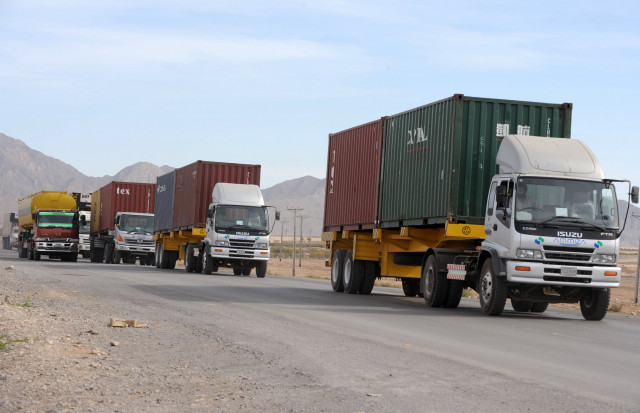Bad for business: Pak-Afghan trade in limbo as sit-ins over NATO supply line continue
Traders say they are suffering huge losses as a result.

A goal of $5 billion has been set for the coming years and it is believed the full potential of trade is around $10 billion, if a conducive business atmosphere is provided.
PHOTO: AFP/ FILE
The Afghanistan-Pakistan Transit Trade Agreement (APTTA) was signed in 2010 and was made operational in 2011. The agreement facilitated Afghan trucks to transport their export to India via Pakistan. The Pakistan-Afghanistan Joint Chamber of Commerce and Industry was also set up to facilitate bilateral trade.
Trade between the two countries has increased in recent years. It stood at $170 million in 2000-01 and approximately increased to nearly $2.51 billion in 2010-11. A goal of $5 billion has been set for the coming years and it is believed the full potential of trade is around $10 billion, if a conducive business atmosphere is provided.

Afghan trader Shahnawaz Khan said the primary demand of Afghan businessmen is that Pakistan’s internal problems should not affect the transport of goods to the landlocked country. “We have been paying thousands of dollars as detention and demurrage fee for receiving goods via Pakistan,” he added.
He said Afghan banks do not allow international payments for imports via Iranian territory, which creates further problems. He maintained the Pakistani government should find a permanent solution, as the supply of goods to Afghanistan has been stopped for different reasons at different times. Unauthorised checking of documents and permits causes multiple problems for traders, including loss of perishable items, added Shahnawaz.
“This might cause trade with Afghanistan to decrease drastically and businesses to switch over to other countries, like Iran,” said Khyber-Pakhtunkhwa Standing Committee on Land Routes Chairperson Ziaul Haq Sarhadi.
“Almost 80% of businesses have already shifted from Pakistan to Iran’s Bandar Abbas port,” revealed Sarhadi. “Before the sit-in, 40 to 50 commercial containers crossed the border on a daily basis, but now they have dropped by half. Containers full of goods are stranded in different parts of the country, with transporters waiting to cross the border.”
Published in The Express Tribune, December 23rd, 2013.













COMMENTS
Comments are moderated and generally will be posted if they are on-topic and not abusive.
For more information, please see our Comments FAQ